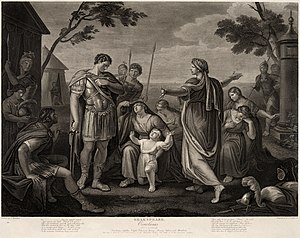Datta, Dayadhvam, and Damyata come from a Hindu fable of thunder. The three are meant to evoke the sound of thunder, and mean Giving, Compassion, and Control.
In the poem, Dayadhvam (Compassion) says that "We think of the key, each in his prison/Thinking of the key, each confirms a prison." What is this "key" that Elliot talks about? It might be sort of an unattainable goal, a pipe-dream that alienates a person in trying to achieve it. By searching for a "key" to unlock something in one's life, one is admitting to feeling trapped, as in in a prison.

Coriolanus was a Roman general who was exiled from Rome after proving an unpopular leader and later rallied an army to enact vengeance upon his former city.
A possible relationship between Coriolanus and the "Key" may have to do with him being largely motivated by personal pride and the belief that he was a more suitable leader for Rome, rather than leave the decision to a popular vote. His ego left him "trapped" in his own prison, and his conquest for revenge was an attempt to find the key.
What is the connection then between exile, pride, and Dayadhvam (Compassion)? Coriolanus in his pursuit of power obviously lacked “compassion,” and this led to his exile, his downfall. A similar instance of self-centered alienation appears in the Part I of the poem: “The Burial of the Dead,” where the speaker says “A crowd flowed over London Bridge, so many/….And each man fixed his eyes before his feet./Flowed up the hill and down King William Street.” King William Street is a main financial district in London. These men “fix[ing] their eyes before [their] feet” could reflect those people fixated only on their careers and becoming disconnected from each other. The speaker calls out one of these men named Stetson, making an allusion to the Battle of Mylae which was fought between Rome and Carthage, also referring back to the Roman Coriolanus. The speaker asks Stetson: “That corpse you planted last year in your garden,/Has it begun to sprout? Will it bloom this year?” One could think that the speaker is asking if the Roman’s victory at Mylae was “worth it” after all, if the “corpse” that Stetson “planted” will ever “bloom” or grow into anything substantial. Given that corpses don’t do anything except rot in the ground, Stetson and the rest of the crowd can be seen as men pursuing empty goals and becoming exiled from their humanity in the process. The need for Dayadhvam becomes more apparent as they are each “confim[ing] [their] own prison[s]”



